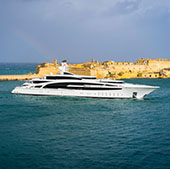Malta’s significance within the maritime transport industry has duly been noted this past decade, where through various efforts, Malta has been named the EU’s largest shipping registry and the sixth largest globally. Malta’s success in this industry has been attributed to its adherence to international standards, its relatively easy registration procedure as well as its beneficial tax scheme. After 5 years of discussion with the European Commission, Malta will finally be introducing a Tonnage Tax Scheme as of 1st April which will further bring about success within the maritime sphere. This incentive aims at strengthening our tonnage tax principles whilst also promoting the registration of ships in Malta and Europe. It has also been determined that such measures are in line with the EU State Aid Guidelines and will be applicable over the coming 10 years.
Application of the Scheme
The scheme provides that any income, profits or gains which derive from shipping activities carried out by a licensed shipping organisation may be exempt from tax under the Income Tax Act, provided that the registration fees and tonnage taxes are duly paid. Therefore, in order to apply for this scheme, one must have a Maltese company which has a commercial vessel registered within the EU. The requirements of this scheme highlight the importance of keeping account separate for shipping and non-shipping activities in order to properly determine the net tonnage rate.
The main benefit of this regime is that instead of calculating the tax due according to income, profit or gains deriving from shipping activity, a flat rate will be paid in accordance with the net tons, where the regime specifies the standard rates applicable. The rate is dependant on the age of the ship, where the standard rates are based on 10-15-year-old vessels. If, however the vessel is older than 15 years, there is a surcharge of maximum 50%. On the other hand, if the vessel is between 0-5% there will be a reduction of 30% and if between 5-10 years it will be subject to a reduction of 15%.
A subsequent benefit resulting from the application of this scheme is the inapplicability of the Social Security Act, provided those involved are operating as officers of employees within a licenced shipping organisation, and are not resident in Malta. The Duty on Documents will also be exempt in relation to the tonnage tax ship, and any restrictions held in the External Transactions Act in relation to the ownership, operation, purchase and management of a Tonnage Tax Ship in Malta will not be applicable.
Other Tonnage Tax Regimes
As mentioned above, Malta’s advantageous tax regimes have played a significant role in its success within the maritime sphere. Currently, our corporate tax rate is 35%, which may be reduced to 5%, whilst our social security rate is that of 10%. When comparing these rates with those of others who offer some form of tonnage tax scheme, Malta’s rates are seen to be quite favourable to foreigners. The Tonnage Tax Scheme of the UK provides a corporate tax rate of 19% and a social security tax rate of 13.8%, whilst the Greek Tonnage Tax Regime holds a corporate tax rate of 29% and a social security tax rate of 25.06%. It can therefore be deduced that having a vessel bearing the Malta Flag is not only beneficial due to its reputability, but also due to the attractive tax regimes in place.
During the period of 2012-2016, it has been noted on a worldwide level that Malta’s flag registry has grown 10.1% per year and has been placed with the top 10 flag states in the world. The EU Commissioner for Competition Margrethe Vestager has held that the “Tonnage tax systems are meant to promote the competitiveness of the EU shipping industry in a global market without unduly distorting competition. I am pleased that Malta committed to adapt its tonnage tax system to achieve this. Moreover, by encouraging the registration of ships in the EU, the scheme will enable the European shipping industry to keep up its high social and environmental standards”. Commentators have held that this scheme will play an important role within global competition, where foreign ship companies are expected to register in Malta and the EU, whilst still preserving the competition within the EU Single Market.

